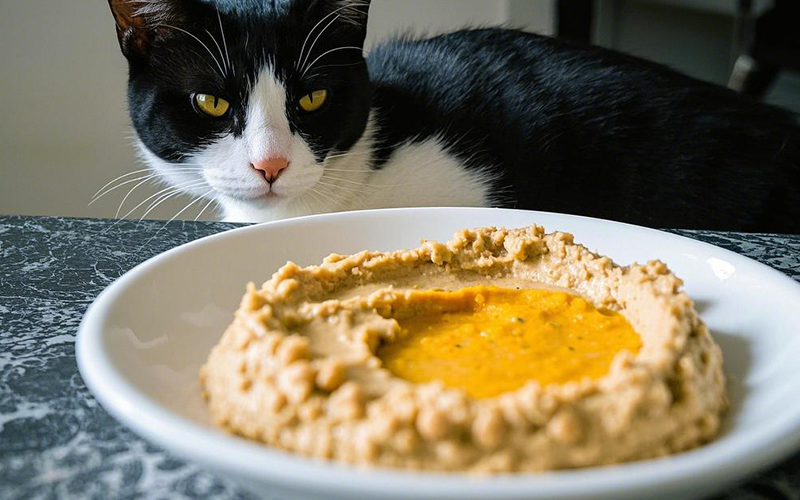Can Cats Eat Hummus? Let’s Find Out!
- 18 Mar 2025 10:31
Hummus is a popular snack made primarily from chickpeas (garbanzo beans), olive oil, tahini, garlic, lemon juice, and other seasonings. While it’s a healthy option for humans, can cats eat hummus? The answer is no—hummus is not safe for cats and should be avoided. Here’s why!

🍽️ Why Hummus Isn’t Safe for Cats
Although hummus is made from chickpeas, which are not toxic to cats, several ingredients in hummus can pose risks:
Garlic: Garlic is toxic to cats and can cause serious health problems, such as anemia, digestive upset, and even organ damage when consumed in large amounts. Even small amounts of garlic can be harmful over time.
Tahini (Sesame Seeds): While sesame seeds themselves aren’t toxic to cats, tahini can be rich in fats, which aren’t ideal for felines. Too much fat can lead to digestive upset, weight gain, or pancreatitis in cats.
Lemon Juice: Citrus fruits like lemons contain compounds called psoralens, which are toxic to cats and can cause digestive problems, lethargy, and even skin irritation.
Olive Oil: While olive oil is generally safe for cats in very small quantities, it’s high in fat and calories. Overconsumption of olive oil can contribute to weight gain and upset your cat’s digestive system.
Salt and Spices: Some hummus recipes contain salt or other spices that are harmful to cats. Too much salt can cause dehydration, kidney issues, and other health problems in felines.
⚠️ Potential Risks of Feeding Hummus to Cats
Feeding hummus to your cat can result in the following risks:
Digestive Upset: The garlic, lemon, and spices in hummus can irritate your cat’s stomach, causing symptoms like vomiting, diarrhea, and bloating.
Toxicity: Garlic and certain spices can be toxic to cats, leading to more serious health issues if ingested in larger amounts over time.
Weight Gain: The high fat content in hummus, especially from olive oil and tahini, can lead to obesity or pancreatitis in cats if consumed regularly.
Choking Hazard: The thick texture of hummus might be difficult for some cats to swallow, posing a choking risk.
🐱 Healthier Alternatives to Hummus for Cats
If you’re looking for healthier, safer treats for your cat, here are some great alternatives:
Plain Cooked Chicken: A great protein source for your cat, cooked chicken (without seasoning or skin) is a much safer and healthier option. 🍗
Catnip: A harmless and fun treat that many cats love, catnip can provide a natural, enjoyable experience for your feline. 🌿
Cooked Fish: Fish like salmon or tuna (without any bones or seasoning) can be a nutritious treat packed with omega-3 fatty acids. 🐟
Freeze-Dried Meat Treats: These treats are high in protein and free from unnecessary fats or additives, making them an excellent option for your cat.
🤖 PettureX: Your Pet Health Assistant
If you’re ever unsure about whether a food is safe for your cat or need personalized advice on their diet, PettureX can help! PettureX is an AI-powered pet health assistant offering 24/7 guidance on all aspects of pet care, including food safety. With PettureX, you can easily find out what foods are safe and suitable for your feline friend. 🐾💡
🏁 Conclusion: Can Cats Eat Hummus?
In conclusion, hummus is not safe for cats due to the presence of garlic, lemon, tahini, and other spices that can be harmful. It’s best to avoid offering hummus to your cat altogether and stick to safer, cat-friendly treats like plain chicken or cooked fish.
For all your pet health concerns and dietary questions, PettureX is here to offer expert advice anytime, anywhere! 🐱💚
Related

The Burning Question: Can Cats Eat Jalapenos? A Comprehensive Safety Guide
- 21 Apr 2025
Cool Temptation: Can Cats Eat Ice Cream Safely? The Vet-Backed Truth
- 21 Apr 2025
Frankly Dangerous: Can Cats Eat Hot Dogs? Vet Explains the Serious Risks
- 16 Apr 2025
A Purrfect Protein? Can Cats Eat Ground Turkey Safely? (Vet-Reviewed Guide)
- 16 Apr 2025
Gritty Situation: Can Cats Eat Grits Safely? Vet Explains the Risks
- 16 Apr 2025
Crunchy Query: Can Cats Eat Green Peppers? A Vet-Reviewed Safety Analysis
- 16 Apr 2025
Gravy Danger Zone: Can Cats Eat Gravy Safely? (Vet-Reviewed Warning)
- 16 Apr 2025
Toxic Temptation: Can Cats Eat Grapefruit? Vet Explains the Dangers
- 16 Apr 2025
Emergency Meal or Major Mistake? Can Cats Eat Dog Food For A Couple Days? (Vet Guide)
- 16 Apr 2025
Dandelions & Felines: Can Cats Eat These Common Weeds Safely? Vet Explains
- 16 Apr 2025
